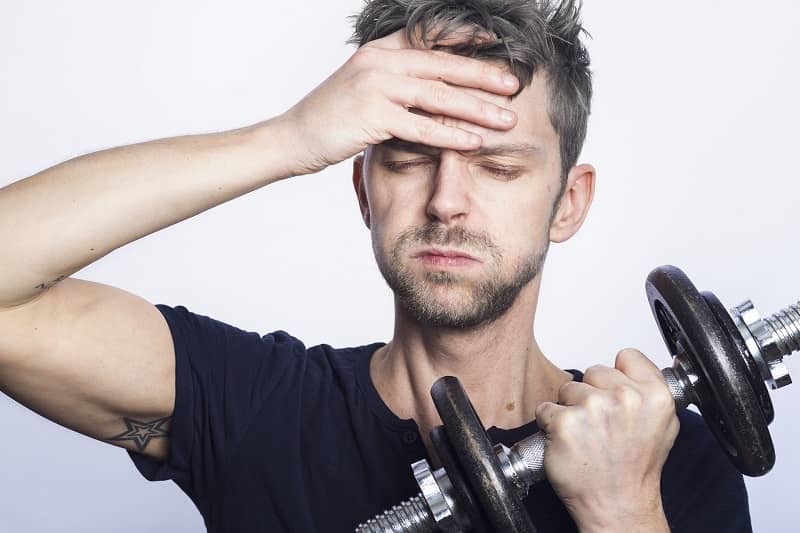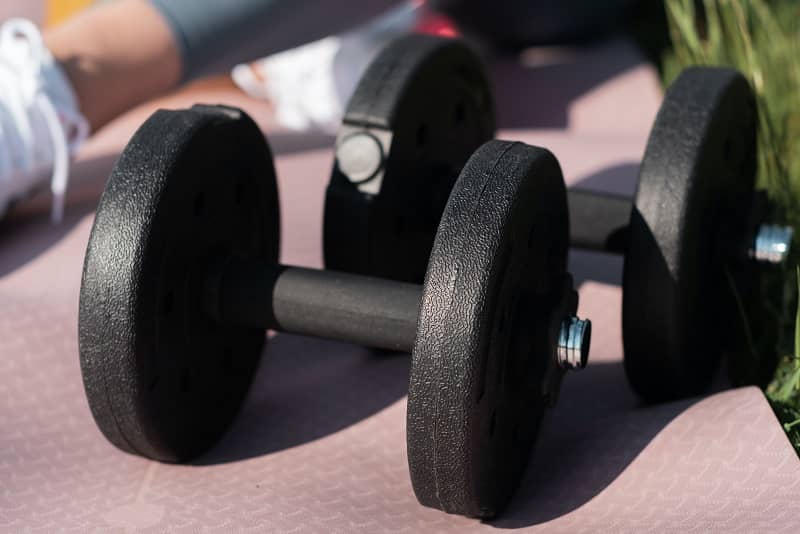


25 Jun Common Symptoms & Causes of Muscle Loss [W/ Diet and Exercise Tips]
Am I losing muscle or fat?
-Perhaps one of the most commonly asked questions by someone who has been experiencing unexplained weight loss all of a sudden!
Well, losing muscle mass and fat are as different from each other as a burger is from a sandwich.
Luckily, gauging the difference between the two is also easy.
Signs of losing muscle mass are often clear as day when you feel fatigued and notice rapid weight loss.
Noticing these lately?
Then, chances are you’re already losing muscle and not fat, my friend.
In general, witnessing these signs of muscle loss is mainly because of aging and is nothing much to worry about.
This age-related muscle loss is called sarcopenia in medical terms. However, what if these signs start showing up at an unusual time in your life? Say when you’re 24 or 25?
Now, this can be frightening and is often not as plain as sarcopenia. Rather a sedentary lifestyle is to blame in these cases.
Regardless, this can be fixed! And this blog will assist you in doing just that.
But, because of the variety of causes behind muscle loss, your first line of treatment should be to understand your symptoms better.
Most Common Signs of Losing Muscle Mass


Have you been noticing these signs of muscle loss?
- Inability to finish workouts
- Loss of energy and chronic fatigue
- Sudden weight loss
- Unproductive workouts without much progress
- Difficulty maintaining balance
- Loss of stamina
There are possible ways of reversing these symptoms of losing muscle mass by regaining the lost muscle.
But for that, one needs to be aware of the causes and the right treatment for muscle loss, in a specific scenario. That’s only possible if one spots the muscle loss signs in time.
Hence, under this section, we focus on what muscle loss does to your body, and how it shows its presence. Look out for these muscle mass loss symptoms and how they affect your day-to-day activities.
#1. Strained Workouts
Though workouts are tough, with your muscles going down, they might turn out to be a complete nightmare.
You might just wanna skip them altogether. Apart from this, a feeling of weakness and low strength while performing a workout are also some signs you are losing muscle.
Thus, if you feel you are no longer able to perform the same number of reps as before, your muscles might be hinting at something.
#2. Body Fat Percentage Remains the Same
If your weight on the scale keeps going down, but you cannot see a change in your fitness level, it’s a sign of muscle loss.
Also, a key factor that shows muscle loss is no change in your shape. Muscle loss doesn’t let you shape up your body the way you want to.
You might notice your circumference reducing but there’s no muscle tone. You look weak and unfit even when you’re losing weight.
#3. Quick Weight Loss
Weight loss is something many of us dream of.
You might be ecstatic to see those numbers going down on the scale if you’ve been on a diet for that purpose.
But those fast-moving numbers might not be as good of an indicator for your muscles. Sudden weight loss is one of the most common signs of losing muscle mass, in fact.
Since bodyweight is also about muscle weight, a rapid decrease can be a sign of muscle depletion.
This is especially true if weight loss is accompanied by loss of muscle tone and an increase in fatigue.
#4. Sluggish Days
Lack of energy and a feeling of tiredness are often the first symptoms of losing muscle mass.
Moreover, the issue is even more severe if you’re not eating well and even skipping breakfast and meals for weight loss.
In this case, Signs of muscle loss while dieting often gets severe, and you might not be able to even get out of bed.
Lack of nutrition and loss of muscle leads to impaired functions, perpetuating the cycle of low energy.
However, in some cases, if a person loses weight along with the decrease in daily performance, it might be because of overtraining.
#5. No Progress in Workouts
If you still cannot do more reps than the number you started with a month ago, your muscles need some attention.
It might be that you’re following the wrong way of doing workouts and need the help of a professional. Regardless, loss of muscle means weakness and mobility, both of which make you prone to falls and fractures.
And there are many serious signs of losing muscle mass too!
Signs You are Losing Muscle Mass Because of a Medical Condition



There are various reasons behind muscle loss. One of these reasons includes an underlying medical condition.
If your muscle loss is because of any such condition, it might show signs like:
- Balance problems in walking, running and even standing
- Difficulty in speaking
- Facial weakness
- Signs of muscle atrophy in hands like loss of tingling sensation in hands
- Fatigue and feeling of illness
- General stiffness that lasts for hours
- Swelling in areas that were once injured
Apart from these, the symptoms of muscle loss that point towards life-threatening conditions include:
- Change in consciousness or alertness
- Slurred speech
- Paralysis or an inability to move
- Pain in the muscles of your eyes
- Severe episodes of headache
Excluding the medical condition induced muscle atrophy, other symptoms of muscle loss can be reversed.
Muscle Loss – Common Causes and Their Solutions
The loss of muscle tissues can be because of various reasons and is often referred to as atrophy or muscle wasting.
“Muscle atrophy” is when the muscle tissues become smaller.
While atrophy marks the decrease in the size of the muscles, muscle wasting is basically muscle withering.
But there are ways with which you can reverse muscle loss depending upon the cause.
Check if these are the reasons for the loss of muscle tissue. If yes, it’s easily fixable.
#1. Poor Nutrition
Poor nutrition is responsible for many health conditions including loss of muscle mass.
In fact, the International Osteoporosis Foundation points out that a diet lacking lean proteins, fruits, and vegetables causes loss of muscle mass.
Poor nutrition might also cause muscle atrophy by giving rise to medical conditions like:
- Irritable bowel syndrome
- Celiac disease
Excluding the medical conditions, you can reverse the signs of losing muscle mass by correcting your diet.
Remedy



If you have always been asking why am I losing weight but eating more, then this solution is especially for you.
You’ve been losing weight because of muscle loss, courtesy of your diet lacking important nutrients.
You can reverse this by taking a diet rich in proteins. Animal protein is the best source of protein as they contain the right proportion of all the amino acids you need.
Yet, you must stay away from red and processed meat as it has high levels of fat.
You can rather go for:
- 3.5 ounces of lean chicken or salmon
- 6 ounces of Greek yogurt
- 9 grams of skim milk
- 18 grams cooked beans
#2. Age
As a person grows old, many factors reduce muscle growth. They cause the muscle to shrink, often leading to sarcopenia.
In fact, according to a report from the FDA, sarcopenia affects almost one-third of people above 60.
The age factors that contribute to muscle loss in old age include:
- Less protein synthesis
- The decline in testosterone levels
However, this muscle mass can again be reversed.
Remedy
A possible reason behind sarcopenia is the decline in healthy testosterone levels.
Hence a possible solution to reverse muscle loss among older men is by reversing the decline in the T-levels.
This can be done with the help of supplements as well as testosterone-boosting exercises.
In fact, according to researchers, testosterone supplements were able to add lean body mass among older men.
We would say the best way to build muscles is progressive resistance training.
It can ideally help people, in older age, restore lost muscles without hurting themselves.
#3. Sedentary Lifestyle
Most people lose their muscles because of a sudden change to a sedentary lifestyle, which involves less active movements.
This can even be because of your laziness or because of hospitalization. Though, hospitalization makes it difficult to combat muscular atrophy.
Remedy
- Physical therapy – Through physical therapies, you can participate in well-planned activities that don’t hurt your muscles. Rather, they help boost muscle synthesis.
- Passive Movement – In case you’re not ready to get into active movements, you can participate in doing passive moves. This way the therapist would gently help to move your legs and arm. It’s usually for people who were once hospitalized but have recovered now.
Other than the above reversible causes of muscle atrophy, there are certainly other causes of muscle loss.
Genetic and Other Causes of Muscle Loss
Other than the above reasons, there are two more causes that affect our muscles.
These include:
#1. The Genetic Causes
Sometimes, you might notice unexplained weight loss with normal blood tests.
This might be because of genetic muscle loss affecting your body and, hence, causing weight loss.
Spinal Muscular Atrophy (SMA) is one such genetic medical condition that impairs the motor nerve cells and causes muscle loss.
Many types of this disorder cause the loss of muscles:
- SMA linked to chromosome 5 – This causes the deficiency of motoneuron proteins leading to impaired muscle synthesis.
- SMA not linked to chromosome 5.
Another genetic disorder causing muscle loss includes the muscular dystrophy group of disorders.
#2. Medical Conditions Causing Muscle Loss
There are certain chronic disorders and diseases which are also responsible for causing muscle atrophy and wasting like:
- Amyotrophic Lateral Sclerosis – This condition involves many types of disorders that cause impairment in the motor nerve cells controlling muscle growth.
- MS – It’s a chronic condition in which the immune system goes against the nervous system resulting in nerve inflammation.
- Arthritis – This condition characterizes inflammation of the joints causing pain and stiffness. It doesn’t affect the muscles directly, rather gradually reduces immobility causing disuse atrophy.
- Myositis – It refers to the inflammation of the muscles and causes weakness in the muscles. Usually, people develop myositis during viral infections.
- Polio – It is an infectious disease attacking the nervous system causing permanent paralysis. However, you can still consult your doctor for muscle wasting medications in such medical conditions.
- Neurological Conditions – Injuries that damage the nerves responsible for controlling your muscles can also cause muscle wasting. These injuries usually affect the contraction of the muscles, stopping them because of the reduced signals from the nerves.
But What happens when you lose muscle mass in all these cases is ultimate weakness and inability to perform your regular workout.
Despite such serious causes of muscle atrophy, you must not lose hope and should seek treatment.
But, if your muscle loss is not because of a medical condition, there are many things you can do to fix the situation. If you’re wanting to try something at home, first fix your diet and nutrition. And then you can try some exercises for preventing the severe effects of atrophy.
Also, when coupled with the right nutrients, they prove out to help reverse the signs of muscle loss.
General Tips – Diet and Exercise for Muscle Loss
The strongest way of combating muscle atrophy is by moving your muscles and following the right diet.
Hence, this section picks up the best exercises and diet tips to fight muscle atrophy.
Exercises



Combining aerobic exercises, resistance training, and balance training can not just prevent but even reverse muscular atrophy.
#1. Resistance Training
Resistance training usually includes exercises like weight lifting or moving your body against gravity.
Performing resistance exercises helps in increasing the strength of your muscle fibers by exerting tension on them. They also help in stimulating the actions of growth-promoting hormones.
#2. Fitness Training
Exercises that elevate your heart rate like aerobic and endurance exercises can also reverse muscle wasting.
Studies show aerobic exercises are effective in treating sarcopenia. Although no specific aerobic exercise has been identified for the same, yet it works well. In case you cannot perform such tough exercises, you can even try walking daily.
#3. Walking
Walking has also been seen as an effective way of preventing and reversing muscle atrophy.
According to a study conducted on over 879 adults aging above 60, fast walkers had less tendency to develop sarcopenia.
Now, apart from the exercises, you must also take care of your diet if you want to regain your muscles.
Diet and Nutrients



If your diet lacks vital nutrients, you might be at a high risk of losing muscles.
In fact, people suffering from nutrient deficiencies are more prone to muscular atrophy than others.
However, you can still combat these deficiencies by adding high levels of the following nutrients:
#1. Proteins
Proteins build up the signals that your muscles need for growth. Consuming more protein in your diet increases the growth of your muscles as they receive more signals.
Though, you may have to decide which type of protein you primarily want to rely on.
Read >> Vegan vs Whey Protein Powder
Regardless, there are many studies that claim protein to be an effective way of boosting muscle mass.
One study conducted on 33 men over the age of 70 showed that daily consumption of 35 grams of protein enhances muscle growth. The second study showed that a group of young men needed only 20 grams of protein to show the same increase in muscles. A third study, considering 7 men over the age of 65, saw that taking 15 grams of protein supplements daily results in muscle growth.
All these results were possible because of the amino acid, leucine, present in the proteins that regulate muscle growth.
Rich sources of leucine:
- Whey protein
- Meat
- Fish
- Eggs
- Soy protein
#2. Vitamin D
Vitamin D has been often linked with sarcopenia, though the reasons are not clear.
However, we definitely know that taking Vitamin D supplements can not only increase your muscle strength but also reduce the chances of muscle weakness.
#3. Omega-3 Fatty Acids
Consuming omega-3 fatty acids is ideally good for your muscle health as it stimulates muscle growth.
According to a study conducted on 45 women, 2 grams of fish oil supplement daily with resistance training increases muscle strength more just doing the exercises.
These benefits might be because of the anti-inflammatory benefits of omega-3 fatty acids.
Final Thoughts
While there are a number of causes behind muscle loss, many are treatable. But the best way to dodge muscle loss is still to prevent it from happening in the first place.
Hence, some of the best ways which you can try out to prevent losing your muscle definition include:
- A nutritious diet
- Exercises
- Hydration
- More protein
- Enough sleep
All these prevention methods, along with the above-mentioned tips, are enough to help you deal with muscular atrophy.
However, make sure you consult your doctor if you are losing muscle mass and its signs progressively worsen.
FAQs
Check out the answers to commonly-asked questions regarding muscle loss.



No Comments